The UK Home Office has released the Statement of Changes HC 997, bringing the 2025 immigration reforms into effect. The 140-page update introduces significant changes from 22 July 2025, particularly affecting the Skilled Worker visa, salary thresholds, and eligibility for care workers.
In this blog, we summarise the most important updates for UK employers—particularly care providers and sponsor licence holders—and explain what you need to do now to stay compliant.
What Is the Immigration Statement of Changes HC 997?
The Immigration Rules: Statement of Changes HC 997, issued on 1 July 2025, enacts several of the reforms first proposed in the 2025 Immigration White Paper. The government says these changes are designed to "restore order and control" to the UK immigration system.
The key focus areas include:
- Raising the minimum skill and salary thresholds for sponsored workers
- Reducing reliance on international recruitment for care roles
- Tightening dependant rights for sub-degree workers
- Overhauling shortage occupation lists
These changes will affect how employers sponsor overseas workers—especially in the care, hospitality, and other RQF Level 3–5 sectors.
Key Changes Introduced by HC 997 (Effective 22 July 2025)
1. Higher Skill Threshold for Skilled Worker Visas
From 22 July, all new Certificates of Sponsorship (CoS) must relate to occupations classified at RQF Level 6 or higher. This shift excludes 100–180 roles that were previously eligible for sponsorship, including:
- Care workers (SOC 6135)
- Senior care workers (SOC 6136)
- Chefs, warehouse staff, retail supervisors, etc.
To reflect this change, Appendix Skilled Occupations is now split into:
- Tables 1–3: RQF Level 6+ roles (standard Skilled Worker eligibility)
- Tables 1a, 2aa, 3a: RQF Level 3–5 roles eligible only under limited, temporary shortage lists
⛔ No skill-level exceptions for overseas recruits post-22 July unless the job appears on an interim shortage list.
2. New Salary Thresholds for Sponsored Workers
All Skilled Worker visa applications from 22 July must meet one of the new salary thresholds based on the 2024 Annual Survey of Hours and Earnings (ASHE):
✅ Only the first 48 working hours per week count towards these thresholds
✅ No transitional protection for extensions or role changes after 22 July
Key points:
- Applies to all Skilled Worker, Global Business Mobility, and Scale-up visa routes
- No transitional protection: existing sponsored workers extending or switching roles must meet the new thresholds
- For most employers, this means revising salary bands immediately to remain eligible to sponsor workers
3. Two Interim Shortage Lists Introduced
Until a permanent model is in place, two new temporary shortage lists have been introduced:
- Immigration Salary List (ISL) – Includes RQF 3–5 jobs deemed in shortage by the Migration Advisory Committee (MAC)
- Temporary Shortage List (TSL) – Covers roles critical to the government’s Modern Industrial Strategy
Important:
- Both lists expire on 31 December 2026
- The government reserves the right to shorten or revise them
Temporary Shortage List (TSL) Occupations
To help you identify eligible roles, here’s the complete list of SOC codes and job titles included in the Temporary Shortage List (TSL):
Automate Home Office Audits with Borderless
The Borderless platform provides a centralized system for all sponsorships, automating reminders for key tasks and ensuring best practices across your organization, simplifying audit preparation and ongoing compliance.
4. Care Workers No Longer Eligible for Sponsorship
This is the most significant blow to the care sector:
- From 22 July 2025, SOC Codes 6135 (Care Workers) and 6136 (Senior Care Workers) will be removed from the Skilled Worker eligible occupation list
- No new out-of-country CoS can be issued for these roles after this date
- In-country switching will remain only until July 2028, and only where:
- The worker has already been employed with the sponsor for at least 3 months
- The role existed prior to the cut-off
5. Dependant Rights Removed for Most Sub-Degree Roles
Also from 22 July:
- Workers sponsored into RQF Level 3–5 jobs via the ISL or TSL can no longer bring family dependants
- This mirrors existing rules for care workers
- RQF 6+ jobs are unaffected
6. ⚠️ Stricter Rules on Supplementary Employment
Skilled Worker visa holders previously could take on 20 hours/week of supplementary work in any shortage role.
From 22 July, new visa holders can only do supplementary work that is:
- In the same occupation as their sponsored role, or
- In an RQF 6+ role, or
- On the Immigration Salary List
⛔ This limits job flexibility for workers and increases right-to-work risks for employers.
What Employers Need to Do Now
The July 2025 changes are significant—and urgent. Employers should:
✅ Audit current employee salaries against the new thresholds
✅ Check upcoming CoS assignments against RQF level and shortage lists
✅ Review offer letters, HR documentation, and onboarding packs
✅ Train staff on changes to SMS workflows and Right to Work checks
✅ Monitor future consultations on English language requirements and the Immigration Skills Charge
Need Help Staying Compliant?
At Borderless, we help over 500+ UK employers stay compliant, sponsor with confidence, and simplify immigration.
Book a demo with our immigration team to see how we can help.






